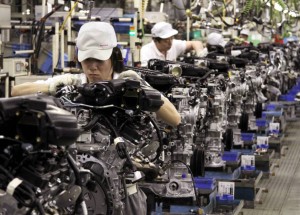Today, the Shibaura Institute of Technology Workers Union both struck and leafleted the university. Five members of the union struck all three of their Monday lessons, from 1:00pm to 5:50pm.
This was the first day of the new semester and thus it was necessary to explain the strike to students whom the university has not made aware of its ongoing labor dispute with non-Japanese English teachers it wishes to fire and replace with Japanese-speaking English teachers.
To this end, a total of seven striking teachers and other supporters from parent-union Zenkoku Ipppan Tokyo General Union, or Tozen, leafleted the Omiya campus’s Higashi-Omiya Station bus stop from 12:20pm to 12:50pm. Reaction was positive from students and teachers alike, with many of those leafleted expressing sympathy with the unfair treatment the strikers are receiving.
The union plans to continue industrial action until the university stops stonewalling and agrees to some kind of compromise.

